The Gold Standard for Global Education
Internationalizing the Student Experience
During the week of November 16, the Mount Holyoke campus was awash with banners and signs celebrating the sixteenth anniversary of International Education Week. Indeed, Mount Holyoke had a lot to celebrate. On November 17, President Lynn Pasquerella ’80 attended a celebration and ceremony in Washington, DC, where she participated in a panel discussion on internationalization in higher education with the leaders of other top institutions. Later that evening Pasquerella accepted the Senator Paul Simon Award for Comprehensive Internationalization, presented to Mount Holyoke College by NAFSA: Association of International Educators.
The College was among five institutions selected to receive the prestigious award, which annually recognizes a small number of colleges and universities that are using innovative, creative approaches to make significant, well-documented progress toward comprehensive internationalization.
“It is a great honor to receive this award,” says Eva Paus, Carol Hoffmann Collins Director of the McCulloch Center for Global Initiatives, who also attended the ceremony in DC and was first notified of the honor last February. “It recognizes the College’s achievements in international education over the last ten years and highlights that we are at the forefront in an area that is a top priority for all institutions of higher education in the country.”
A World of Opportunities
Last spring, newly admitted students received a welcome letter from Paus highlighting some of the many programs and resources available at the College that can help prepare them for successful careers and citizenship in today’s rapidly changing global world.
“You may choose among many courses with an international focus, learn another language, or participate in a team-taught global challenges course where you will meet with renowned scholar-practitioners in culminating conferences,” Paus wrote.
Students may also complete an international internship or study abroad in one of MHC’s many programs and exchanges, or in one of more than 150 other programs and universities. Currently, MHC students are studying in thirty countries across six continents.
Global, Even Before She Was Born
While every student’s story is different, Shahd Al-Jawhari ’17 epitomizes the effectiveness of the Mount Holyoke approach. Al-Jawhari grew up in Jordan the daughter of a Filipino mother and a Jordanian father, in a household that emphasized the importance of understanding other cultures and empowering women—even though the larger culture did not. She chose to attend Mount Holyoke because she wanted to transform herself from a self-described introvert into a quietly effective leader.
“I used to be afraid of speaking up in class, and it took courage to voice my opinion,” she says. A first-year seminar on gender and cyberculture—issues that affect women around the world—gave Al-Jawhari the chance to participate in discussions and to see how her ideas impacted other people’s thinking.
“I learned to have more of an open mind about people who have different perspectives and different backgrounds,” she says.
A few months later, she began attending weekly Student Senate meetings, where she listened as roughly 150 student leaders met to discuss issues and concerns on campus. “I didn’t think I had much to contribute,” she says.
But her peers in the Arab Student Association thought otherwise, and they elected her to represent them in her sophomore year. That experience taught her the importance of discussing problems, listening to diverse opinions, and looking for solution-based actions.
“Living outside of your culture gives you a different perception of how things are and how society works,” she says. “You also gain a different perspective on yourself.”
Al-Jawhari began serving as Chair of Halls this year. Her leadership roles inform her other work on campus, including her work in the Alumnae Association, where she assists in helping alumnae of all ages to navigate a constantly evolving campus.
The McCulloch Center
Stories like Al-Jawhari’s delight the staff of the McCulloch Center, which was founded in 2004 to implement strategic internationalization within the entire community of faculty, students, staff, and alumnae. Its mission reflects a history of international outreach that dates back to 1839—two years after the College’s founding—when its first international student enrolled. In 1928 the first MHC students studied abroad, at the Sorbonne in Paris. Since then MHC has developed internationally focused curricular and cocurricular offerings. Based on such a rich context, international education became a strategic priority in 2003.
From the beginning, the McCulloch Center’s work has been innovative, integrative, and collaborative. Study abroad, international student services, and immigration services were incorporated into the newly created entity. The Center also created the position of director of international experiential learning—held by Kirk Lange—to promote and support internships and research abroad.
Shortly thereafter, Paus and her staff began reaching out to College faculty—25 percent of whom are foreign born—to develop and implement international education initiatives. Faculty members from all three academic divisions participated in the new cross-departmental initiatives. Among them: incorporating scholars-in-residence into classes; using information technology to bring global perspectives into the classroom; facilitating and mentoring student internships and research abroad; team-teaching global challenges courses; and integrating learning-abroad advising into advising in students’ majors.
In the spring eight faculty members from the computer science, economics, international relations, philosophy, physics, and politic science departments will team-teach a two-credit course to explore with 160 students how globalization and robotization affect the future of jobs. The course will culminate in a conference hosted by the Center on February 19–20, during which authorities from around the world will analyze these challenges from different perspectives and draw lessons for action.
The Power of International Diversity in the Classroom
International learning happens in traditional classroom settings as well, as it always has at Mount Holyoke, with students across disciplines teaching each other by bringing their cultures into the classroom.
Holly Hanson, chair of the history department, vividly recalls a moment when she was teaching a course on African culture. Several African American students asked if they could analyze how people use hairstyle to claim elite status. After giving a well-argued, well-evidenced presentation, the group said to their peers, “You have no idea how much harder it is to take care of our hair.”
That led to a long, frank discussion.
“The students with [straight] hair like mine asked the questions they had always wanted to ask but never had an opportunity to,” Hanson says. The result was greater understanding and respect all around. “I loved it. And that is so Mount Holyoke,” says Hanson.
Jon Western, Carol Hoffmann Collins ’63 Professor of International Relations and Five College Professor of International Relations, teaches US foreign policy, international security, human rights, and humanitarian affairs. In all of his classes, Western spends a great deal of time discussing the complexity of the world’s challenges, which can be a bit overwhelming, he says, given the constant drumbeat of the news. Yet because his students bring so many perspectives to the classroom, he says, they “can identify and discuss an extensive set of examples in which people can and do create significant change.”
For instance, he says, “In countries with cultures that emphasize respect for elders, families concerned about environmental pollution reach out to the parents and grandparents of the managers of factories that are dumping toxins into water streams.”
This would be unheard of in the US but is highly effective in other countries.
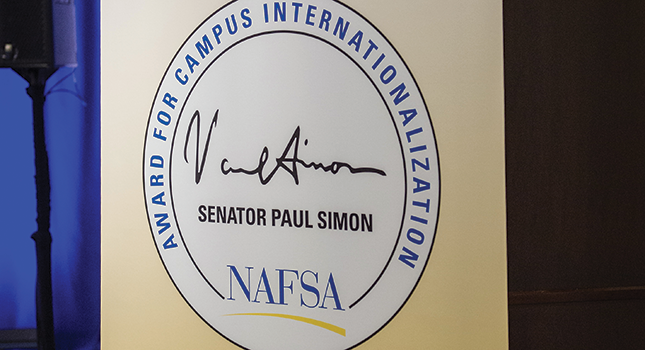
A banner at the Simon Award ceremony in November. Photo by NAFSA
Global Lynk: Learning Abroad
The opportunity to study or intern abroad is crucial to the Center’s mission, says Paus. She and her colleague Joanne Such Picard MA ’86, dean of international studies, met with faculty early on in the Center’s history to discuss how they could support this goal for all students, regardless of their major course of study. One result of their work was that the share of science majors in the study-abroad population increased from 9 percent in 2006–07 to 16 percent in 2013–14. Another success: the percentage of African American students studying abroad rose from 26 percent in 2003–04, below the MHC average, to 44 percent in 2013–14.
To increase the number of internships available, the Center has leveraged a program founded by Professor Ruth Lawson in 1950: the MHC International Internship Program (MHC-IIP). Under the leadership of Lange this global network of partner organizations now stretches across twenty countries around the world and offers internships in fields ranging from publishing to policy analysis and from second-language acquisition to social entrepreneurship.
Mount Holyoke alumnae have been instrumental in the success of MHC-IIP, brokering the majority of placements. Vijaya Pastala ’89, for example, has created two internships in her award-winning social enterprise Under the Mango Tree, which addresses declining crop production and unstable incomes for rural farmers in India. Pastala serves as mentor to her interns, helping them connect their studies at MHC to her work reintroducing honey bees that pollinate crops and produce honey that farmers can sell.
Pastala has worked with MHC students from Vietnam, India, and the US. “I continue to be dazzled by their determination to make a difference and their ability to balance their sensitivities with the insight necessary to understand poverty and to build on their intellectual understanding of global standards so they can enhance their internship experience,” she says.
“International internships enable students to see theory in practice, to learn a foreign language through new professional usages and vocabulary, and to better understand who they are in the world. And this could not happen without our alumnae,” says Lange.
Communicating Across Difference
As news spread about the import of the Senator Paul Simon Award, people all across campus celebrated the honor by considering once again what it means to be an effective leader and responsible global citizen.
For Donna Van Handle ’74, senior lecturer in German Studies and dean of international students, the short answer involves speaking another person’s language, both literally and figuratively. As she often tells international students—who comprise more than a quarter of the student body—“Employers value not only the ability [of workers] to speak multiple languages—but to know, learn, and understand the cultural meaning and cultural context expressed by using a particular language.”
As a German major whose Irish grandmother had worked at MHC, Van Handle understood the concept of globalization early in life.
“International students have that understanding before they arrive on campus,” she says, which is why their interaction with domestic students and the local community “enriches not only their lives but the lives of those with whom they interact or have contact.”
A poignant example of this happens each November, when the international student dean in concert with the Alumnae Association runs a Thanksgiving program that allows international students to enjoy the holiday meal with a local family or spend a few days with an alumna nearby.
The interaction helps both students and alumnae expand their understanding of another culture and of the enduring bonds MHC fosters.
“Many students and alums stay in touch for the entire time the student is at MHC and beyond,” Van Handle says. “One international student remarked that it was the best experience she’d ever had.”
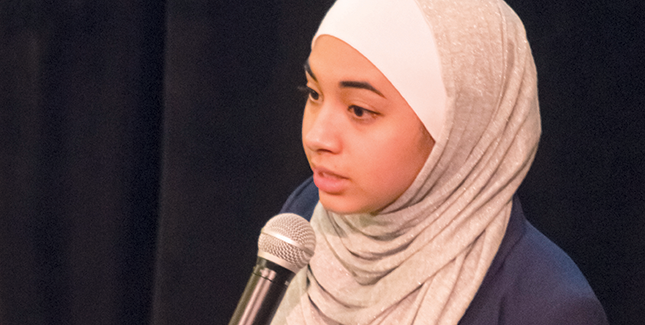
Chair of Halls Shahd Al-Jawhari ’17, a member of the College’s Student Government Association’s Executive Board who also serves as chair of the Arab Student Association, speaks at a Student Senate meeting in November. Photo by James Gehrt
A Mini United Nations
Every day on campus Mount Holyoke students from across the United States and from seventy countries around the world come together to learn how to be leaders in an increasingly complex, interconnected world. They come to develop communication skills and to learn how to promote collaboration, create consensus, and build community to achieve their goals. They come to listen, discuss, and understand other perspectives before using that understanding to tackle some of the world’s most pressing problems: hunger, environmental destruction, social injustice, and war.
As a matter of course, these students all across campus demonstrate how internationalization can enrich one’s daily life. For some, that means discussing cultural or racial differences with a roommate from another nation; for others it means attending a campus event sponsored by one of twenty-nine international student organizations. Still others reflect on comments they heard from an international expert who addressed one of their classes via teleconferencing.
For Al-Jawhari, internationalization is profound, just like the multi-faith lunch she attends every Wednesday at Eliot House. There, students share their day-to-day struggles and support one another in myriad ways. “Sometimes the group listens to a personal story or talks about a project someone is working on,” she says. “MHC is a home away from home for anyone, because the students make it what it is.”
The group’s unwavering support of one another informs Al-Jawhari’s dreams for the future, which include starting a nonprofit to empower young women in her native Jordan. What she has learned here, on MHC’s 800 acres, applies to the global stage as well. “We are all here together. We are the ones who create the community,” she says.
—By Elizabeth Lund
Elizabeth Lund is a writer and reviewer based near Boston.
This article appeared in the winter 2016 issue of the Alumnae Quarterly.
January 15, 2016


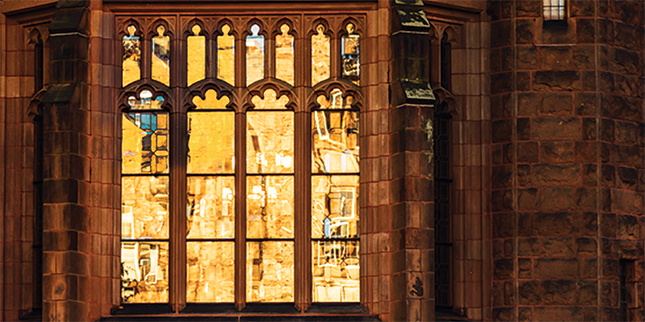
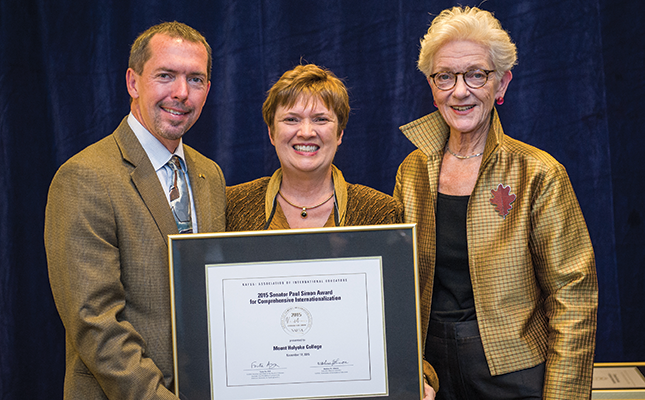





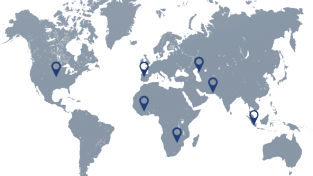

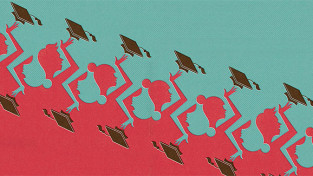
Leave a Reply